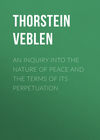Read the book: «An Inquiry into the Nature of Peace and the Terms of Its Perpetuation», page 15
CHAPTER VI
Elimination of the Unfit
It may seem early (January 1917) to offer a surmise as to what must be the manner of league into which the pacific nations are to enter and by which the peace will be kept, in case such a move is to be made. But the circumstances that are to urge such a line of action, and that will condition its carrying out in case it is entered on, have already come into bearing and should, on the whole, no longer be especially obscure to anyone who will let the facts of the case rather than his own predilections decide what he will believe. By and large, the pressure of these conditioning circumstances may be seen, and the line of least resistance under this pressure may be calculated, with due allowance of a margin of error owing to unknown contingencies of time and minor variables.
Time is of the essence of the case. So that what would have been dismissed as idle vapour two years ago has already become subject of grave deliberation today, and may rise to paramount urgency that far hence. Time is needed to appreciate and get used to any innovation of appreciable gravity, particularly where the innovation depends in any degree on a change in public sentiment, as in this instance. The present outlook would seem to be that no excess of time is allowed in these premises; but it should also be noted that events are moving with unexampled celerity, and are impinging on the popular apprehension with unexampled force,—unexampled on such a scale. It is hoped that a recital of these circumstances that provoke to action along this line will not seem unwarrantably tedious, and that a tentative definition of the line of least resistance under pressure of these circumstances may not seem unwarrantably presumptuous.
The major premise in the case is the felt need of security from aggression at the hands of Imperial Germany and its auxiliary Powers; seconded by an increasingly uneasy apprehension as to the prospective line of conduct on the part of Imperial Japan, bent on a similar quest of dominion. There is also the less articulate apprehension of what, if anything, may be expected from Imperial Russia; an obscure and scarcely definable factor, which comes into the calculation chiefly by way of reenforcing the urgency of the situation created by the dynastic ambitions of these other two Imperial States. Further, the pacific nations, the leading ones among them being the French and English-speaking peoples, are coming to recognise that no one among them can provide for its own security single-handed, even at the cost of their utmost endeavour in the way of what is latterly called "preparedness;" and they are at the same time unwilling to devote their force unreservedly to warlike preparation, having nothing to gain. The solution proposed is a league of the pacific nations, commonly spoken of at the present stage as a league to enforce peace, or less ambitiously as a league to enforce arbitration. The question being left somewhat at loose ends, whether the projected league is to include the two or three Imperial Powers whose pacific intentions are, euphemistically, open to doubt.
Such is the outline of the project and its premises. An attempt to fill in this outline will, perhaps, conduce to an appreciation of what is sought and of what the conditioning circumstances will enforce in the course of its realisation. As touches the fear of aggression, it has already been indicated, perhaps with unnecessary iteration, that these two Imperial Powers are unable to relinquish the quest of dominion through warlike enterprise, because as dynastic States they have no other ulterior aim; as has abundantly appeared in the great volume of expository statements that have come out of the Fatherland the past few years, official, semi-official, inspired, and spontaneous. "Assurance of the nation's future" is not translatable into any other terms. The Imperial dynasty has no other ground to stand on, and can not give up the enterprise so long as it can muster force for any formidable diversion, to get anything in the way of dominion by seizure, threat or chicane.
This is coming to be informally and loosely, but none the less definitively, realised by the pacific nations; and the realisation of it is gaining in clearness and assurance as time passes. And it is backed by the conviction that, in the nature of things, no engagement on the part of such a dynastic State has any slightest binding force, beyond the material constraint that would enforce it from the outside. So the demand has been diplomatically phrased as a demand for "substantial guarantees." Any gain in resources on the part of these Powers is to be counted as a gain in the ways and means of disturbing the peace, without reservation.
The pacific nations include among them two large items, both of which are indispensable to the success of the project, the United States and the United Kingdom. The former brings in its train, virtually without exception or question, the other American republics, none of which can practicably go in or stay out except in company and collusion with the United States. The United Kingdom after the same fashion, and with scarcely less assurance, may be counted on to carry the British colonies. Evidently, without both of these groups the project would not even make a beginning. Beyond this is to be counted in as elements of strength, though scarcely indispensable, France, Belgium, the Netherlands and the Scandinavian countries. The other west-European nations would in all probability be found in the league, although so far as regards its work and its fortunes their adhesion would scarcely be a matter of decisive consequence; they may therefore be left somewhat on one side in any consideration of the circumstances that would shape the league, its aims and its limitations. The Balkan states, in the wider acceptance, they that frequent the Sign of the Double Cross, are similarly negligible in respect of the organisation of such a league or its resources and the mutual concessions necessary to be made between its chief members. Russia is so doubtful a factor, particularly as regards its place and value in industry, culture and politics, in the near future, as to admit nothing much more than a doubt on what its relation to the situation will be. The evil intentions of the Imperial-bureaucratic establishment are probably no more to be questioned than the good intentions of the underlying peoples of Russia. China will have to be taken in, if for no other reason than the use to which the magnificent resources of that country would be turned by its Imperial neighbour in the absence of insurmountable interference from outside. But China will come in on any terms that include neutrality and security.
The question then arises as to the Imperial Powers whose dynastic enterprise is primarily to be hedged against by such a league. Reflection will show that if the league is to effect any appreciable part of its purpose, these Powers will also be included in the league, or at least in its jurisdiction. A pacific league not including these Powers, or not extending its jurisdiction and surveillance to them and their conduct, would come to the same thing as a coalition of nations in two hostile groups, the one standing on the defensive against the warlike machinations of the other, and both groups bidding for the favor of those minor Powers whose traditions and current aspirations run to national (dynastic) aggrandizement by way of political intrigue. It would come to a more articulate and accentuated form of that balance of power that has latterly gone bankrupt in Europe, with the most corrupt and unreliable petty monarchies of eastern Europe vested with a casting vote; and it would also involve a system of competitive armaments of the same general character as what has also shown itself bankrupt. It would, in other words, mean a virtual return to the status quo ante, but with an overt recognition of its provisional character, and with the lines of division more sharply drawn. That is to say, it would amount to reinstating the situation which the projected league is intended to avert. It is evidently contained in the premises that the projected league must be all-inclusive, at least as regards its jurisdiction and surveillance. The argument will return to this point presently.
The purpose of the projected league is peace and security, commonly spoken of under patriotic preconceptions as "national" peace and security. This will have to mean a competent enforcement of peace, on such a footing of overmastering force at the disposal of the associated pacific nations as to make security a matter of ordinary routine. It is true, the more genial spokesmen of the project are given to the view that what is to come of it all is a comity of neutral nations, amicably adjusting their own relations among themselves in a spirit of peace and good-will. But this view is over-sanguine, in that it overlooks the point that into this prospective comity of nations Imperial Germany (and Imperial Japan) fit like a drunken savage with a machine gun. It also overlooks the patent fatality that these two are bound to come into a coalition at the next turn, with whatever outside and subsidiary resources they can draw on; provided only that a reasonable opening for further enterprise presents itself. The league, in other terms, must be in a position to enforce peace by overmastering force, and to anticipate any move at cross purposes with the security of the pacific nations.
This end can be reached by either one of two ways. If the dynastic States are left to their own devices, it will be incumbent on the associated nations to put in the field a standing force sufficient to prevent a recourse to arms; which means competitive armament and universal military rule. Or the dynastic States may be taken into partnership and placed under such surveillance and constraint as to practically disarm them; which would admit virtual disarmament of the federated nations. The former arrangement has nothing in its favour, except the possibility that no better or less irksome arrangement can be had under existing circumstances; that is to say that the pacific nations may not be able to bring these dynastic states to terms of disarmament under surveillance. They assuredly can not except by force; and this is the precise point on which the continued hostilities in Europe turn today. In diplomatic parable the German Imperial spokesmen say that they can accept (or as they prefer to phrase it, grant) no terms that do not fully safeguard the Future of the Fatherland; and in similarly diplomatic parable the spokesmen of the Entente insist that Prussian militarism must be permanently put out of commission; but it all means the same thing, viz. that the Imperial establishment is to be (or is not to be) disabled beyond the possibility of its entering on a similar warlike enterprise again, when it has had time for recuperation. The dynastic statesmen, and the lay subjects of the Imperial establishment, are strenuously set on securing a fair opportunity for recuperation and a wiser endeavour to achieve that dominion which the present adventure promises to defeat; while the Entente want no recurrence, and are persuaded that a recurrence can be avoided only on the footing of a present collapse of the Imperial power and a scrupulously enforced prostration of it henceforth.
Without the definitive collapse of the Imperial power no pacific league of nations can come to anything much more than armistice. On the basis of such a collapse the league may as well administer its affairs economically by way of an all-around reduction of armaments, as by the costlier and more irksome way of "preparedness." But a sensible reduction of armaments on the part of the neutral nations implies disarmament of the dynastic States. Which would involve a neutral surveillance of the affairs of these dynastic States in such detail and with such exercise of authority as would reduce their governments to the effective status of local administrative officials. Out of which, in turn, would arise complications that would lead to necessary readjustments all along the line. It would involve the virtual, if not also the formal, abolition of the monarchy, since the monarchy has no other use than that of international war and intrigue; or at least it would involve the virtual abrogation of its powers, reducing it to the same status of faineantise as now characterises the British crown. Evidently this means a serious intermeddling in the domestic concerns and arrangements of the Fatherland, such as is not admissible under the democratic principle that any people must be left free to follow their own inclinations and devices in their own concerns; at the same time that this degree of interference is imperative if the peace is to be kept on any other footing than that of eternal vigilance and superior armed force, with a people whose own inclinations and devices are of the kind now grown familiar in the German case,—all of which also applies, with accentuation, in the case of Imperial Japan.
Some such policy of neutral surveillance in the affairs of these peoples whose pacific temper is under suspicion, is necessarily involved in a plan to enforce peace by concert of the pacific nations, and it will necessarily carry implications and farther issues, touching not only these supposedly recalcitrant peoples, but also as regards the pacific nations themselves. Assuming always that the prime purpose and consistent aim of the projected league is the peace and security of those pacific nations on whose initiative it is to be achieved, then it should be reasonable to assume that the course of procedure in its organisation, administration and further adaptations and adjustments must follow the logic of necessities leading to that end. He who wills the end must make up his account with the means.
The end in this case is peace and security; which means, for practical purposes, peace and good-will. Ill-will is not a secure foundation of peace. Even the military strategists of the Imperial establishment recommend a programme of "frightfulness" only as a convenient military expedient, essentially a provisional basis of tranquility. In the long run and as a permanent peace measure it is doubtless not to the point. Security is finally to be had among or between modern peoples only on the ground of a common understanding and an impartially common basis of equity, or something approaching that basis as nearly as circumstances will permit. Which means that in so far as the projected peace-compact is to take effect in any enduring way, and leave the federated nations some degree of freedom from persistent apprehension and animosity, as well as from habitual insecurity of life and limb, the league must not only be all-inclusive, but it must be inclusively uniform in all its requirements and regulations.
The peoples of the quondam Imperial nations must come into the league on a footing of formal equality with the rest. This they can not do without the virtual abdication of their dynastic governmental establishments and a consequent shift to a democratic form of organisation, and a formal abrogation of class privileges and prerogatives.
However, a virtual abdication or cancelment of the dynastic rule, such as to bring it formally into the same class with the British crown, would scarcely meet the requirements in the case of the German Imperial establishment; still more patently not in the case of Imperial Japan. If, following the outlines of the decayed British crown, one or the other of these Imperial establishments were by formal enactment reduced to a state of nominal desuetude, the effect would be very appreciably different from what happens in the British community, where the crown has lost its powers by failure of the requisite subordination on the part of the people, and not by a formal abdication of rights. In the German case, and even more in the Japanese case, the strength of the Imperial establishment lies in the unimpaired loyalty of the populace; which would remain nearly intact at the outset, and would thin out only by insensible degrees in the sequel; so that if only the Imperial establishment were left formally standing it would command the fealty of the common run in spite of any formal abrogation of its powers, and the course of things would, in effect, run as before the break. In effect, to bring about a shift to a democratic basis the dynastic slate would have to be wiped very clean indeed. And this shift would be indispensable to the successful conduct of such a pacific league of nations, since any other than an effectually democratic national establishment is to be counted on unfailingly to intrigue for dynastic aggrandizement, through good report and evil.
In a case like that of Imperial Germany, with its federated States and subsidiaries, where royalty and nobility still are potent preconceptions investing the popular imagination, and where loyal abnegation in the presence of authority still is the chief and staple virtue of the common man,—in all such cases virtual abdication of the dynastic initiative under constitutional forms can be had only by a formal and scrupulously complete abrogation of all those legal and customary arrangements on which this irresponsible exercise of authority has rested and through which it has taken effect. Neutralisation in these instances will mean reduction to an unqualified democratic footing; which will, at least at the outset, not be acceptable to the common people, and will be wholly intolerable to the ruling classes. Such a régime, therefore, while it is indispensable as a working basis for a neutral league of peace, would from the outset have to be enforced against the most desperate resistance of the ruling classes, headed by the dynastic statesmen and warlords, and backed by the stubborn loyalty of the subject populace. It would have to mean the end of things for the ruling classes and the most distasteful submission to an alien scheme of use and wont for the populace. And yet it is also an indispensable element in any scheme of pacification that aims at permanent peace and security. In time, it may well be believed, the people of the Fatherland might learn to do well enough without the gratuitous domination of their ruling classes, but at the outset it would be a heartfelt privation.
It follows that a league to enforce peace would have to begin its régime with enforcing peace on terms of the unconditional surrender of the formidable warlike nations; which could be accomplished only by the absolute and irretrievable defeat of these Powers as they now stand. The question will, no doubt, present itself, Is the end worth the cost? That question can, of course, not be answered in absolute terms, inasmuch as it resolves itself into a question of taste and prepossession. An answer to it would also not be greatly to the purpose here, since it would have no particular bearing on the course of action likely to be pursued by these pacific nations in their quest of a settled peace. It is more to the point to ask what is likely to be the practical decision of these peoples on that head when the question finally presents itself in a concrete form.
Again it is necessary to call to mind that any momentous innovation which rests on popular sentiment will take time; that consequently anything like a plébiscite on the question today would scarcely give a safe index of what the decision is likely to be when presently put to the test; and that as things go just now, swiftly and urgent, any time-allowance counts at something more than its ordinary workday coefficient. What can apparently be said with some degree of confidence is that just now, during these two years past, sentiment has been moving in the direction indicated, and that any growing inclination of the kind is being strongly reenforced by a growing realisation that nothing but heroic remedies will avail at this juncture. If it comes to be currently recognised that a settled peace can be had only at the cost of eradicating privilege and royalty from the warlike nations, it would seem reasonable to expect, from their present state of mind, that the pacific nations will scarcely hesitate to apply that remedy,—provided always that the fortunes of war fall out as that measure would require, and provided also that the conflict lasts long enough and severe enough to let them make up their mind to anything so drastic.
There is a certain side issue bearing on this question of the ulterior probabilities of popular sentiment and national policy as to what is to be done with the warlike nations in the event that the allied nations who fight for neutrality have the disposal of such matters. This side issue may seem remote, and it may not unlikely be overlooked among the mass of graver and more tangible considerations. It was remarked above that the United Kingdom is one of the two chief pillars of the projected house of peace; and it may be added without serious fear of contradiction or annoyance that the United Kingdom is also the one among these pacific nations that comes nearest being capable, in the event of such an emergency, to take care of its own case single-handed. For better or worse, British adhesion to the project is indispensable, and the British are in a position virtually to name their own terms of adhesion. The British commonwealth—a very inclusive phrase in this connection—must form the core of the pacific league, if any, and British sentiment will have a very great place in the terms of its formation and in the terms which it will be inclined to offer the Imperial coalition at the settlement.
Now, it happens that the British community entered on this war as a democratic monarchy ruled and officered by a body of gentlemen—doubtless the most correct and admirable muster of gentlemen, of anything approaching its volume, that the modern world can show. But the war has turned out not to be a gentlemen's war. It has on the contrary been a war of technological exploits, reenforced with all the beastly devices of the heathen. It is a war in which all the specific traits of the well-bred and gently-minded man are a handicap; in which veracity, gallantry, humanity, liberality are conducive to nothing but defeat and humiliation. The death-rate among the British gentlemen-officers in the early months, and for many months, ran extravagantly high, for the most part because they were gallant gentlemen as well as officers imbued with the good, old class spirit of noblesse oblige, that has made half the tradition and more than half the working theory of the British officer in the field,—good, but old, hopelessly out of date. That generation of officers died, for the most part; being unfit to survive or to serve the purpose under these modern conditions of warfare, to which their enemy on the other hand had adapted themselves with easy facility from beforehand. The gentlemanly qualifications, and the material apparatus of gentility, and, it will perhaps have to be admitted, the gentlemen, have fallen into the background, or perhaps rather have measurably fallen into abeyance, among the officers of the line. There may be more doubt as to the state of things in respect of the gentility of the staff, but the best that can confidently be said is that it is a point in doubt.
It is hoped that one may say without offense that in the course of time the personnel has apparently worked down to the level of vulgarity defined by the ways and means of this modern warfare; which means the level on which runs a familiar acquaintance with large and complex mechanical apparatus, railway and highway transport and power, reenforced concrete, excavations and mud, more particularly mud, concealment and ambush, and unlimited deceit and ferocity. It is not precisely that persons of pedigree and gentle breeding have ceased to enter or seek entrance to employment as officers, still less that measures have been taken to restrain their doing so or to eliminate from the service those who have come into it—though there may present itself a doubt on this point as touches the more responsible discretionary positions—but only that the stock of suitable gentlemen, uncommonly large as it is, has been overdrawn; that those who have latterly gone into service, or stayed in, have perforce divested themselves of their gentility in some appreciable measure, particularly as regards class distinction, and have fallen on their feet in the more commonplace role of common men.
Serviceability in this modern warfare is conditioned on much the same traits of temperament and training that make for usefulness in the modern industrial processes, where large-scale coordinations of movement and an effective familiarity with precise and far-reaching mechanical processes is an indispensable requirement,—indispensable in the same measure as the efficient conduct of this modern machine industry is indispensable. But the British gentleman, in so far as he runs true to type, is of no use to modern industry; quite the contrary, in fact. Still, the British gentleman is, in point of heredity, the same thing over again as the British common man; so that, barring the misdirected training that makes him a gentleman, and which can largely be undone under urgent need and pressure, he can be made serviceable for such uses as the modern warfare requires. Meantime the very large demand for officers, and the insatiable demand for capable officers, has brought the experienced and capable common man into the case and is in a fair way to discredit gentility as a necessary qualification of field officers.
But the same process of discredit and elimination is also extending to the responsible officials who have the administration of things in hand. Indeed, the course of vulgarisation among the responsible officials has now been under way for some appreciable time and with very perceptible effect, and the rate of displacement appears to be gathering velocity with every month that passes. Here, as in the field operations, it also appears that gentlemanly methods, standards, preconceptions, and knowledge of men and things, is no longer to the purpose. Here, too, it is increasingly evident that this is not a gentlemen's war. And the traditional qualifications that have sufficed in the past, at least to the extent of enabling the British management to "muddle through," as they are proudly in the habit of saying,—these qualifications are of slight account in this technological conjuncture of the nation's fortunes. It would perhaps be an under-statement to say that these gentlemanly qualifications are no longer of any account, for the purpose immediately in hand, and it would doubtless not do to say that they are wholly and unreservedly disserviceable as things run today; but captious critics might find at least a precarious footing of argument on such a proposition.
Through the course of the nineteenth century the British government had progressively been taking on the complexion of a "gentlemen's agreement;" a government by gentlemen, for gentlemen, and of gentlemen, too, beyond what could well be alleged in any other known instance, though never wholly so. No government could be a government of gentlemen exclusively, since there is no pecuniary profit in gentlemen as such, and therefore no object in governing them; more particularly could there never be any incentive in it for gentlemen, whose livelihood is, in the nature of the case, drawn from some one else. A gentlemen's government can escape death by inanition only in so far as it serves the material interest of its class, as contrasted with the underlying population from which the class draws its livelihood. This British arrangement of a government by prudent and humane gentlemen with a view to the conservation of that state of things that best conduced to the material well-being of their own class, has on the whole had the loyal support of the underlying populace, with an occasional floundering protest. But the protest has never taken the shape of an expressed distrust of gentlemen, considered as the staple ways and means of government; nor has the direction of affairs ever descended into the hands of any other or lower class or condition of men.
On the whole, this British arrangement for the control of national affairs by a body of interested gentlemen-investors has been, and perhaps still is, just as well at home in the affectionate preconceptions of the nineteenth-century British as the corresponding German usufruct by self-appointed swaggering aristocrats has been among the underlying German population, or as the American arrangement of national control by business men for business ends. The British and the American arrangements run very much to the same substantial effect, of course, inasmuch as the British gentlemen represent, as a class, the filial generations of a business community, and their aims and standards of conduct continue to be such as are enforced by the pecuniary interests on which their gentility is conditioned. They continue to draw the ways and means of a worthy life from businesslike arrangements of a "vested" character, made and provided with a view to their nourishment and repose. Their resulting usufruct of the community's productive efforts rests on a vested interest of a pecuniary sort, sanctioned by the sacred rights of property; very much as the analogous German dynastic and aristocratic usufruct rests on personal prerogative, sanctioned by the sacred rights of authentic prescription, without afterthought. The two, it will be noted are very much alike, in effect, "under the skin." The great distinguishing mark being that the German usufructuary gentlemen are, in theory at least, gentlemen-adventurers of prowess and proud words, whose place in the world's economy it is to glorify God and disturb the peace; whereas their British analogues are gentlemen-investors, of blameless propriety, whose place it is more simply to glorify God and enjoy Him forever.



















